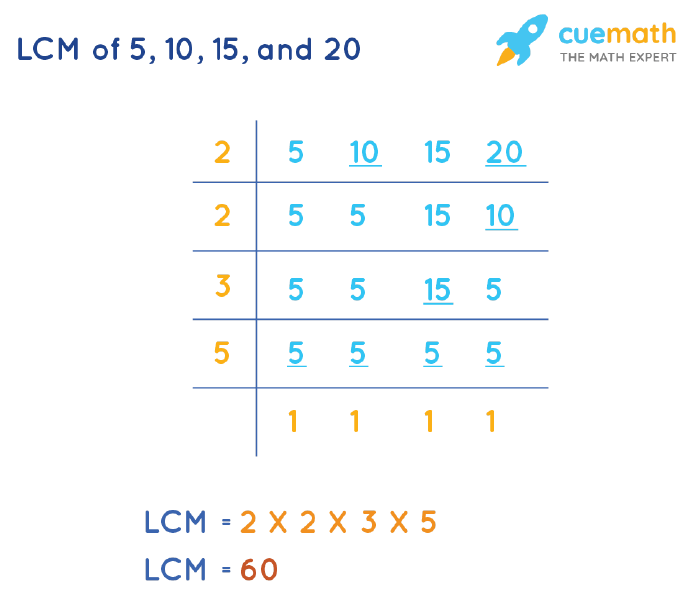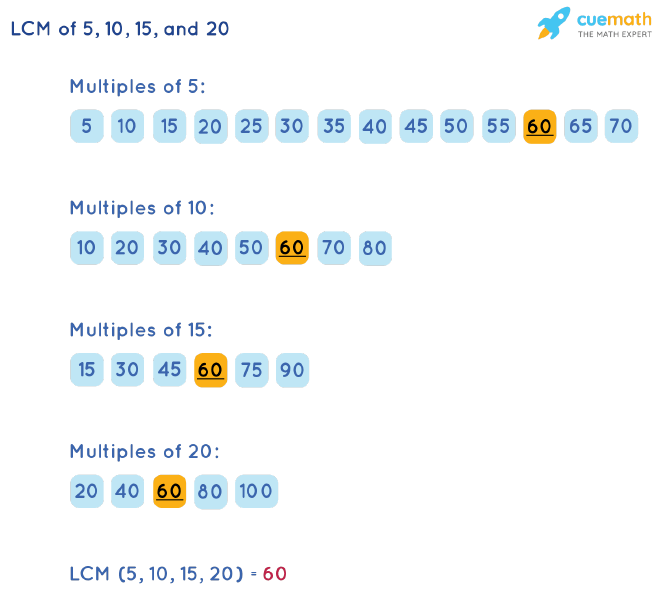LCM of 5, 10, 15, and 20
LCM of 5, 10, 15, and 20 is the smallest number among all common multiples of 5, 10, 15, and 20. The first few multiples of 5, 10, 15, and 20 are (5, 10, 15, 20, 25 . . .), (10, 20, 30, 40, 50 . . .), (15, 30, 45, 60, 75 . . .), and (20, 40, 60, 80, 100 . . .) respectively. There are 3 commonly used methods to find LCM of 5, 10, 15, 20 - by prime factorization, by division method, and by listing multiples.
| 1. | LCM of 5, 10, 15, and 20 |
| 2. | List of Methods |
| 3. | Solved Examples |
| 4. | FAQs |
What is the LCM of 5, 10, 15, and 20?
Answer: LCM of 5, 10, 15, and 20 is 60.

Explanation:
The LCM of four non-zero integers, a(5), b(10), c(15), and d(20), is the smallest positive integer m(60) that is divisible by a(5), b(10), c(15), and d(20) without any remainder.
Methods to Find LCM of 5, 10, 15, and 20
Let's look at the different methods for finding the LCM of 5, 10, 15, and 20.
- By Division Method
- By Listing Multiples
- By Prime Factorization Method
LCM of 5, 10, 15, and 20 by Division Method

To calculate the LCM of 5, 10, 15, and 20 by the division method, we will divide the numbers(5, 10, 15, 20) by their prime factors (preferably common). The product of these divisors gives the LCM of 5, 10, 15, and 20.
- Step 1: Find the smallest prime number that is a factor of at least one of the numbers, 5, 10, 15, and 20. Write this prime number(2) on the left of the given numbers(5, 10, 15, and 20), separated as per the ladder arrangement.
- Step 2: If any of the given numbers (5, 10, 15, 20) is a multiple of 2, divide it by 2 and write the quotient below it. Bring down any number that is not divisible by the prime number.
- Step 3: Continue the steps until only 1s are left in the last row.
The LCM of 5, 10, 15, and 20 is the product of all prime numbers on the left, i.e. LCM(5, 10, 15, 20) by division method = 2 × 2 × 3 × 5 = 60.
LCM of 5, 10, 15, and 20 by Listing Multiples

To calculate the LCM of 5, 10, 15, 20 by listing out the common multiples, we can follow the given below steps:
- Step 1: List a few multiples of 5 (5, 10, 15, 20, 25 . . .), 10 (10, 20, 30, 40, 50 . . .), 15 (15, 30, 45, 60, 75 . . .), and 20 (20, 40, 60, 80, 100 . . .).
- Step 2: The common multiples from the multiples of 5, 10, 15, and 20 are 60, 120, . . .
- Step 3: The smallest common multiple of 5, 10, 15, and 20 is 60.
∴ The least common multiple of 5, 10, 15, and 20 = 60.
LCM of 5, 10, 15, and 20 by Prime Factorization
Prime factorization of 5, 10, 15, and 20 is (5) = 51, (2 × 5) = 21 × 51, (3 × 5) = 31 × 51, and (2 × 2 × 5) = 22 × 51 respectively. LCM of 5, 10, 15, and 20 can be obtained by multiplying prime factors raised to their respective highest power, i.e. 22 × 31 × 51 = 60.
Hence, the LCM of 5, 10, 15, and 20 by prime factorization is 60.
☛ Also Check:
- LCM of 4 and 10 - 20
- LCM of 20 and 35 - 140
- LCM of 12, 15 and 45 - 180
- LCM of 16, 24 and 36 - 144
- LCM of 8, 12 and 20 - 120
- LCM of 12, 15, 18 and 27 - 540
- LCM of 13 and 20 - 260
LCM of 5, 10, 15, and 20 Examples
-
Example 1: Which of the following is the LCM of 5, 10, 15, 20? 60, 45, 27, 35.
Solution:
The value of LCM of 5, 10, 15, and 20 is the smallest common multiple of 5, 10, 15, and 20. The number satisfying the given condition is 60. ∴LCM(5, 10, 15, 20) = 60.
-
Example 2: Find the smallest number that is divisible by 5, 10, 15, 20 exactly.
Solution:
The smallest number that is divisible by 5, 10, 15, and 20 exactly is their LCM.
⇒ Multiples of 5, 10, 15, and 20:- Multiples of 5 = 5, 10, 15, 20, 25, 30, 35, 40, 45, 50, 55, 60, . . . .
- Multiples of 10 = 10, 20, 30, 40, 50, 60, 70, . . . .
- Multiples of 15 = 15, 30, 45, 60, 75, 90, 105, . . . .
- Multiples of 20 = 20, 40, 60, 80, 100, 120, 140, . . . .
Therefore, the LCM of 5, 10, 15, and 20 is 60.
-
Example 3: Find the smallest number which when divided by 5, 10, 15, and 20 leaves 1 as the remainder in each case.
Solution:
The smallest number exactly divisible by 5, 10, 15, and 20 = LCM(5, 10, 15, 20) ⇒ Smallest number which leaves 1 as remainder when divided by 5, 10, 15, and 20 = LCM(5, 10, 15, 20) + 1
- 5 = 51
- 10 = 21 × 51
- 15 = 31 × 51
- 20 = 22 × 51
LCM(5, 10, 15, 20) = 22 × 31 × 51 = 60
⇒ The required number = 60 + 1 = 61.

FAQs on LCM of 5, 10, 15, and 20
What is the LCM of 5, 10, 15, and 20?
The LCM of 5, 10, 15, and 20 is 60. To find the LCM (least common multiple) of 5, 10, 15, and 20, we need to find the multiples of 5, 10, 15, and 20 (multiples of 5 = 5, 10, 15, 20 . . . . 60 . . . . ; multiples of 10 = 10, 20, 30, 40, 60 . . . .; multiples of 15 = 15, 30, 45, 60 . . . .; multiples of 20 = 20, 40, 60, 80 . . . .) and choose the smallest multiple that is exactly divisible by 5, 10, 15, and 20, i.e., 60.
What is the Least Perfect Square Divisible by 5, 10, 15, and 20?
The least number divisible by 5, 10, 15, and 20 = LCM(5, 10, 15, 20)
LCM of 5, 10, 15, and 20 = 2 × 2 × 3 × 5 [Incomplete pair(s): 3, 5]
⇒ Least perfect square divisible by each 5, 10, 15, and 20 = LCM(5, 10, 15, 20) × 3 × 5 = 900 [Square root of 900 = √900 = ±30]
Therefore, 900 is the required number.
Which of the following is the LCM of 5, 10, 15, and 20? 110, 42, 35, 60
The value of LCM of 5, 10, 15, 20 is the smallest common multiple of 5, 10, 15, and 20. The number satisfying the given condition is 60.
How to Find the LCM of 5, 10, 15, and 20 by Prime Factorization?
To find the LCM of 5, 10, 15, and 20 using prime factorization, we will find the prime factors, (5 = 51), (10 = 21 × 51), (15 = 31 × 51), and (20 = 22 × 51). LCM of 5, 10, 15, and 20 is the product of prime factors raised to their respective highest exponent among the numbers 5, 10, 15, and 20.
⇒ LCM of 5, 10, 15, 20 = 22 × 31 × 51 = 60.
visual curriculum